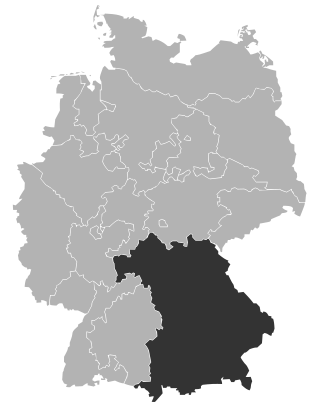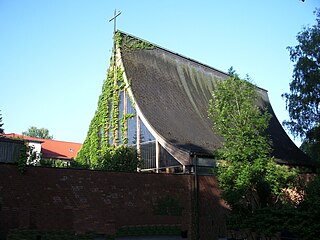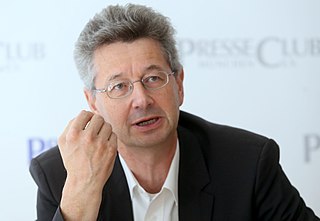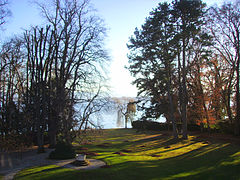
Neue Ostpolitik, or Ostpolitik for short, was the normalization of relations between the Federal Republic of Germany and Eastern Europe, particularly the German Democratic Republic beginning in 1969. Influenced by Egon Bahr, who proposed "change through rapprochement" in a 1963 speech at the Evangelische Akademie Tutzing, the policies were implemented beginning with Willy Brandt, fourth Chancellor of the FRG from 1969 to 1974, and winner of the 1971 Nobel Prize for Peace for his efforts to place this policy at the acme of the FRG.

Lake Starnberg, or Starnberger See ) — called Lake Würm or Würmsee until 1962 — is Germany's second-largest body of fresh water, having great depth, and fifth-largest lake by area. It and its surroundings lie in three different Bavarian districts, or Landkreise. The lake is property of the state and accordingly managed by the Bavarian Administration of State-Owned Palaces, Gardens and Lakes.

Egon Karl-Heinz Bahr was a German SPD politician.

The Evangelical Lutheran Church in Bavaria is a Lutheran member church of the Protestant Church in Germany in the German state of Bavaria.
The Anif declaration was issued by Ludwig III, King of Bavaria, on 12 November 1918 at Anif Palace, Austria.

Lorenz von Westenrieder was a well-known author and historian in Bavaria and a critic of the Elector Karl Theordor and supporter of Maximilian IV Joseph. There are several memorials to him in Munich.

Schloss Wernsdorf is a medieval castle located in the village of Wernsdorf, in Upper Franconia, Bavaria. The castle also has a small park. The oldest parts of the castle can be dated back to the 12th century.

Buch am Forst is a village of 530 inhabitants in the district town (Kreisstadt) of Lichtenfels in the state of Bavaria in Germany. It is 6 kilometers northwest of Lichtenfels and at the western edge of the Lichtenfels Forest. Bundesautobahn 73 [Federal Highway] runs approximately a half-mile (1 km) to the east, while Kreisstraße [District Road] LIF27 goes through the village itself.

The Free State of Coburg emerged from the Duchy of Saxe-Coburg and Gotha at the end of the First World War. It existed from November 1918 until its union with the Free State of Bavaria on 1 July 1920.

The Historische Lexikon Bayerns or Historical Lexicon of Bavaria is a specialist, historical lexicon about the History of Bavaria, which has been published as a genuine online publication. It is the first specialised lexicon on the history of the Free State of Bavaria and its various regions.

Neues Geistliches Lied, abbreviated NGL, is a music genre of songs in German intended for church usage, and based on contemporary lyrics and with music by contemporary composers.
The Toleranzpreis der Evangelischen Akademie Tutzing is a prize that has been awarded biennially by the Evangelische Akademie Tutzing to personalities who have been influential towards a dialogue between cultures and religions. From 2012, an additional prize has been given to support moral courage.
"Danke" is a German Christian hymn written by Martin Gotthard Schneider in 1961. It was one of the first songs in the genre later called Neues Geistliches Lied. The song title was disambiguated to its first line, "Danke für diesen guten Morgen". The song has been included in the hymnal Evangelisches Gesangbuch. It has been called the best-known German sacred song.

Hans-Bussovon Busse was a German architect and academic.
Alfred Hans Zoller was a German composer, jazz pianist, church musician and organist. He is known for the 1964 song "Stern über Bethlehem", which is often used by star singers, and appeared in 2004 as a cover version, She.

Michael Piazolo is a German Free Voter politician, lawyer and political scientist. In 2018 he was appointed as the Bavarian State Minister for Culture and Education in Minister President Söder's second Cabinet.

Heinrich Bedford-Strohm is a German Lutheran bishop.
Horst Leuchtmann was a German musicologist.
Wandel durch Handel, also known as Wandel durch Annäherung, is a term referring to a political and economic notion, mostly associated with German foreign policy, of increasing trade with authoritarian regimes in an effort to induce political change. Although most strongly associated with Germany, similar policies have been pursued by several Western countries.

The House of Poschinger is an ancient Bavarian noble family. Its origin date back to the year 1140. The family received the rank of Knights of the Holy Roman Empire. The Frauenau branch rose to the rank of Barons (Freiherr) in the Kingdom of Bavaria and held a hereditary seat in the House of Councillors.



















